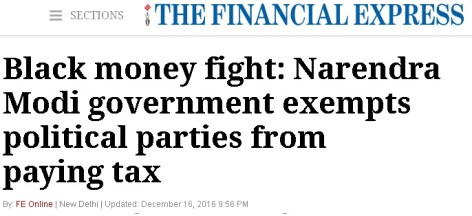I discovered that I enjoyed writing back in 2004 when I first took to blogging. As a shy, introverted girl, Internet was my happy place. “I’ll write a book”, I promised myself.
I was pursuing Chartered Accountancy. My father, who had to struggle a lot growing up, wanted to ensure that his daughter has a secured career. You see, grandfather was also a writer, and writers never got paid as much as Chartered Accountants did.
“Who’d want to read what you write?” he told me in an attempt to discourage me from writing.
In 2013, after completing my 3 years articleship training in Deloitte, Ahmedabad, and with 4 papers in CA finals pending to clear, I gave up. I quit Chartered Accountancy and pursued financial journalism for 2 years. I worked with The Financial Express, Ahmedabad, covering the 2014 elections and 2015 Vibrant Gujarat summit. It was a learning experience. From a cringeworthy first copy that I had filed to an error free copy in two months’ time, I learnt how to file a story.
In May, 2015, I quit to write a book. I had no backup plan. And I wrote. I finished my first draft by September 2015. That’s when I reached out to agents and publishers.
You’d have thought writing the book, about 60,000 odd words, would be the hardest job. Nope. Turns out it is the easier part. Getting a response from publishers and agents is the hard part.
Somehow, the publishing industry has such iron gates, that it is difficult to breach. Most never acknowledged the receipt of proposal and sample chapters. I got countless rejections. One publishing agent even decided to go out of his way to be rude and tell me it is one of the worst. All this because I broke the golden rule of ‘do not follow up otherwise he gets pissed off’. Wow.
Another agent offered ‘editing’ and ‘rewriting’ services for a couple of thousands with ‘no guarantee’ of finding me a publisher.
“Who’d want to read what you write?” kept echoing in my head. I was slowly losing any bit of confidence I ever had.
I couldn’t possibly have written that bad a copy, right? I mean, with all due respect, some of the books of Indian authors which have been published in the last few years are terribly written, with even more awful storyline. Those found publishers willing to pay money to print it! Is my manuscript even worse than that?
I kept the manuscript aside. I was so shattered. I decided I’ll rework the entire copy and go through the ordeal again.
I sat over it for 10 months, without making a single change. There were a few typos and some errors in the finished manuscript, which, as a writer, I missed while proofreading. I didn’t even bother to change them. I had lost all heart to re-read something which got rejected from all quarters.
Then I contemplated self-publishing. But isn’t it the last resort of the brats of rich parents who pay to get their substandard stuff printed? And doesn’t that cost a lot? Should I really pay for something I may end up making eventual loss on?
I checked out various self publishing platforms. Some were reasonable, some were way too expensive. If they were reasonable, the price of your printed book would be so high, no one would buy, and if you wanted to keep a reasonable sales price of your book, you had to pay too much to get it printed. You just couldn’t win there.
I even looked up the new age app-based publishing platforms, but they didn’t excite me as much.
But most of all, I was shocked and disheartened at the sheer lack of communication from the communications professionals. I mean, this entire industry is based on communication, how can you not have proper communication channels. You have to constantly walk on eggshells around them because you could not follow up as they might get offended. Most of the people I interacted with were either rude or arrogant or appeared to just not be interested in talking to someone who doesn’t come ‘highly recommended’ by the mighty and powerful.
Suddenly the idea of going back to studies and finishing off those 4 papers in CA finals seemed like a better idea. Well, I might end up doing something I don’t love, but at least there wouldn’t be heartbreaks like these, right?
And then, one fine day, out of curiosity, I checked out Amazon Kindle’s self publishing tool. I googled it up a bit and within minutes I had made up my mind. I had put in a lot of hard work and love in writing something which I know for a fact is good. I knew I had done a good job. I just wanted more and more people to read it. I registered for Kindle Direct Publishing and within 24 hours, my book was live on Amazon to be purchased and read.
I had put it up out there. I was ready for brickbats and criticism, but secretly hoped every one who purchased the book found it worth their money and time spent on it.
And when I started getting reactions from complete strangers, I was overwhelmed. Everyone had good things to say about it. Yes, there was some constructive criticism which came with it, but every single one liked it. I never strived to write the best-ever award winning fiction. No. I just wanted to entertain people. And I think I have managed to do that.
I am now working on my second book, because, I am not going to give up.
A big shoutout to those who stood by me. And those who didn’t. Those who told me I couldn’t. Because, I did.
You could buy my debut novel, Flawed But Fabulous, by visiting this link.




























